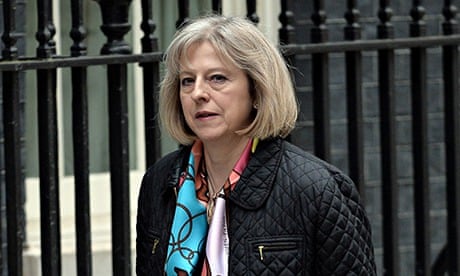Theresa May summoned the internet giant Yahoo for an urgent meeting on Thursday to raise security concerns after the company announced plans to move to Dublin where it is beyond the reach of Britain's surveillance laws.
By making the Irish capital rather than London the centre of its European, Middle East and Africa operations, Yahoo cannot be forced to hand over information demanded by Scotland Yard and the intelligence agencies through "warrants" issued under Britain's controversial anti-terror laws.
Yahoo has had longstanding concerns about securing the privacy of its hundreds of millions of users – anxieties that have been heightened in recent months by revelations from the whistleblower Edward Snowden.
In February, the Guardian revealed that Britain's eavesdropping centre GCHQ intercepted and stored the images of millions of people using Yahoo webcams, regardless of whether they were suspects. The data included a large quantity of sexually explicit pictures.
The company said this represented "a whole new level of violation of our users' privacy".
The home secretary called the meeting with Yahoo to express the fears of Britain's counter-terrorism investigators. They can force companies based in the UK to provide information on their servers by seeking warrants under the Regulation of Investigatory Powers Act, 2000 (Ripa).
The law, now under review by a parliamentary committee, has been widely criticised for giving police and the intelligence agencies too much access to material such as current emails and internet searches, as well as anything held on company records.
However, the Guardian has been told that Charles Farr, the head of the office for security and counter-terrorism (OSCT) within the Home Office, has been pressing May to talk to Yahoo because of anxiety in Scotland Yard's counter-terrorism command about the effect the move to Dublin could have on their inquiries.
Farr, a former senior intelligence officer, coordinates the work of Scotland Yard and the security service MI5, to prevent terrorist attacks in the UK.
"There are concerns in the Home Office about how Ripa will apply to Yahoo once it has moved its headquarters to Dublin," said a Whitehall source. "The home secretary asked to see officials from Yahoo because in Dublin they don't have equivalent laws to Ripa. This could particularly affect investigations led by Scotland Yard and the national crime agency. They regard this as a very serious issue."
The move to make Dublin the centre of its headquarters for Europe, the Middle East and Africa (EMEA) was announced last month and will take effect from Friday.
In a statement at the time, Yahoo said Dublin was a natural home for the company and that it would be incorporated into Irish laws.
The firm insisted the move was driven by "business needs … we believe it is in the best interest of our users. Dublin is already the European home to many of the world's leading global technology brands."
However, the firm has been horrified by some of the surveillance programmes revealed by Snowden and is understood to be relieved that it will be beyond the immediate reach of UK surveillance laws.
Following the Guardian's disclosures about snooping on Yahoo webcams, the company said it was "committed to preserving our users trust and security and continue our efforts to expand encryption across all of our services." It said GCHQ's activity was "completely unacceptable..we strongly call on the world's governments to reform surveillance law."Explaining the move to Dublin, the company said: "The principal change is that Yahoo EMEA, as the new provider of services to our European users, will replace Yahoo UK Ltd as the data controller responsible for handling your personal information. Yahoo EMEA will be responsible for complying with Irish privacy and data protection laws, which are based on the European data protection directive."
Emma Carr, deputy director of Big Brother Watch, said: "It should not come as a surprise if companies concerned about maintaining their users' trust to hold their information start to move to countries with more rigorous oversight processes, particularly where courts oversee requests for information." Surveillance laws have a direct impact on our economy and Yahoo's decision should be ring an alarm in Parliament that ignoring the serious questions about surveillance that are being debated around the world will only harm Britain's digital economy."
Under Ripa, a warrant can be issued for an investigation that has implications for national security, or might lead to the prevention or detection of serious crimes.
Warrants to seek the retention of communications data can be issued by specified officers within police forces and the intelligence agencies.
More intrusive surveillance techniques can require the signature of a cabinet minister. From Friday, investigators may have to seek information by using a more drawn out process of approaching Yahoo through a Mutual Legal Assistance Treaty between Ireland and the UK.
A Home Office spokesperson said: "We do not confirm the details of private meetings."
